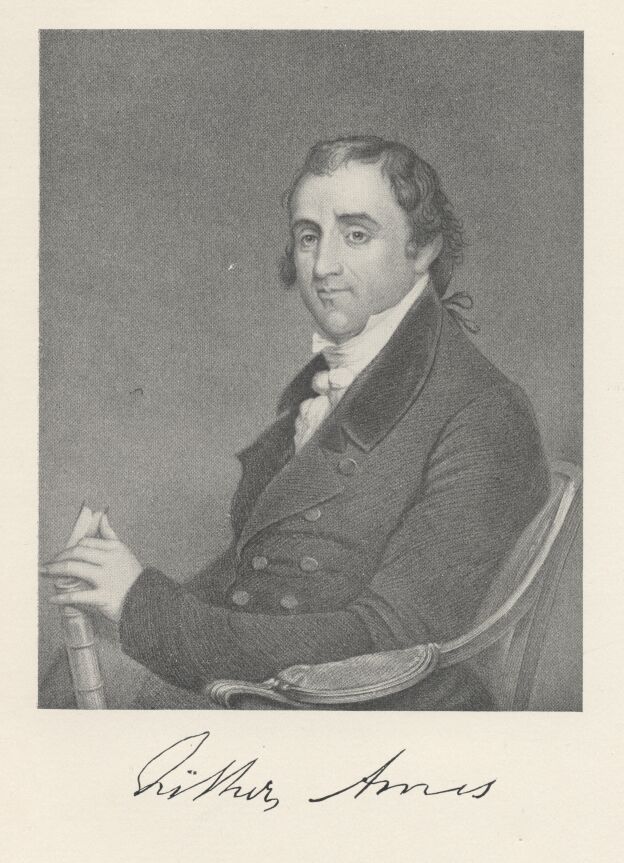- Fisher Ames
Infobox Congressman
name =Fisher Ames

state =Massachusetts
district =1st
term_start =March 4 ,1789
term_end =March 3 ,1797
preceded =None
succeeded =Theodore Sedgwick
birth_date =April 19 ,1758
birth_place =Dedham, Massachusetts
death_date =July 4 ,1808
death_place =Dedham, Massachusetts
restingplace =Old First Parish Cemetery, Dedham, Massachusetts
restingplacecoordinates =
birthname =
nationality =
party =Federalist
otherparty =
spouse =
relations =
children =
residence =
alma_mater =Harvard University
occupation =
profession =Law
net worth =
cabinet =
committees =
portfolio =
religion =
website =
footnotes =Fisher Ames (
April 19 ,1758 –July 4 ,1808 ) was a Representative in theUnited States Congress from the 1st Congressional District ofMassachusetts .Life and political career
Ames was born in
Dedham, Massachusetts . His father, a physician, died when Fisher was but six years old, but his mother resolved, in spite of her limited income, to give the boy a classical education. At the age of six he began the study of Latin, and at the age of twelve, he was sent toHarvard College graduating in 1774 when he began work as a teacher. While teaching school Ames also studied law. He was admitted to the bar, and commenced practice in Dedham in 1781.His father, Dr.
Nathaniel Ames , "was a man of an acute and active mind, and is best known as the author of theAmes Almanac s," which were the inspiration for thePoor Richard's Almanac s.cite journal| author=Erastus Worthingtom| title=Diary of Dr. Nathanial Ames| journal=Dedham Historical Register| year=1890| url=http://books.google.com/books?vid=OCLC06830664&id=QYUg7ThPFTsC&pg=PA1&lpg=PA1&dq=dedham+historical+register#PPA9,M1]In 1788, he served in the
Massachusetts House of Representatives . He became a member of the Massachusetts convention that ratified theUnited States Constitution that same year.Ames was elected to the First, Second and Third Congresses and as a Federalist to the Fourth Congress. He served in Congress from
March 4 ,1789 toMarch 3 ,1797 . During the First Congress, he was chairman of the Committee on Elections. In 1796, he was not a candidate for renomination but resumed the practice of law in Dedham. He stayed in politics and was a member of the Governor's Council from 1798 to 1800. In his new role, Ames offered one of the great orations on the death of President Washington. He also published a number of essays, critical of Jefferson's followers.In 1805, Ames was chosen president of
Harvard University . He declined to serve because of failing health. Four years later, in 1808, he died in Dedham on July 4. He was interred in the Old First Parish Cemetery after a public funeral in Boston.Despite his limited number of years in public service, Fisher Ames ranks as one of the more influential figures of his era. Ames led Federalist ranks in the House of Representatives. His acceptance of the Bill of Rights garnered support in Massachusetts for the new Constitution. His greatest fame however may have come as an orator. Ames offered one of the first great speeches in American Congressional history when he spoke in favor of the
Jay Treaty .In 2002, the [http://www.ameschristian.org/index.html Ames Christian University] was named after Fisher Ames.
References
"The rights of conscience, of bearing arms, of changing the government, are declared to be inherent in the people."-Fisher Ames
Further reading
*"Dictionary of American Biography": Ames, Fisher;
*"Works of Fisher Ames: With a Selection from His Speeches and Correspondence". Edited by Seth Ames. 2 vols. 1854. Reprint. New York: DaCapo Press, 1969;
*Bernhard, Winfred E.A. "Fisher Ames: Federalist and Statesman, 1758-1808". Chapel Hill: University of North Carolina Press, 1965.External links
Wikimedia Foundation. 2010.
